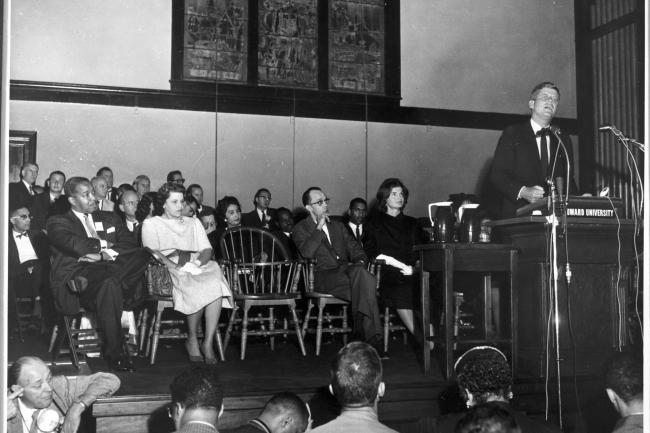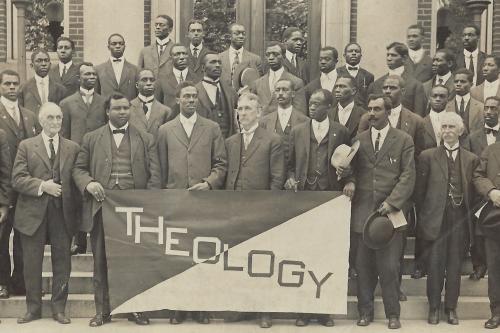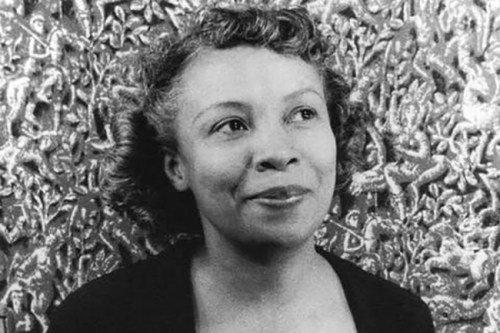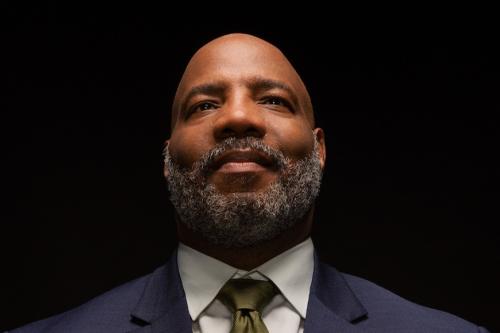If the walls of the Andrew Rankin Memorial Chapel could talk, they’d surely have their share of stories.
Luminaries from archbishops to American presidents have graced the Rankin Chapel pulpit, inarguably one of the most historically significant platforms in our nation’s history.
Constructed between 1894 and 1895 and dedicated in 1896, the humble edifice situated adjacent to Founders Library has welcomed the world’s greatest orators, men and women who have descended specifically upon the Howard University campus for some of their most famous speeches and sermons.
The office of the Dean of the Chapel is its own museum of memories featuring photographs of Rankin’s most notable visitors. As the Chapel’s dean for the last 30 years, Rev. Dr. Bernard L. Richardson, PhD, has had a front-row seat to more great sermons than he can remember. “In my time, I’ve been blessed to experience the giants,” he smiled. “We are standing on the shoulders of some of the greats.”
Given his insight, Dean Richardson was reticent to rank his favorites — “You’re going to get me in trouble!” he joked — but was much more excited to discuss these speakers through another lens.
“I’m opposed to this idea of ‘the best,’ because it’s not a competition,” Dean Richardson underscored. “There are many types of preachers – ministers with different gifts. To me, it’s about the speakers who have been most effective.”
Atop that list are three historic figures who played an integral role in Dean Richardson’s personal ministry: the “dean of American preachers” Gardner C. Taylor; Howard alum and civil rights attorney Vernon Jordan; and Howard alum and renowned theologian Jeremiah A. Wright.
Reverend Taylor “had a gift of being able to take the best of biblical scholarship and combine it with traditional Black preaching,” according to Dean Richardson. “He was an expert at combining the mind and the heart.”
Jordan “had a tremendous gift,” Dean Richardson shared. “He represented the non-ordained minister with the power to reach people.” Jordan labored over his sermons, sharing countless drafts with Dean Richardson and Reverend Taylor – one of Jordan’s closest friends – until his message struck just the right chords. “Preaching at Rankin Chapel was something Vernon Jordan cherished,” Dean Richardson said.
Dean Richardson was just as effusive in his praise of Reverend Wright. “[Wright] has one of the most effective preaching and pastoral ministries I’ve seen,” Dean Richardson asserted. “From his prophetic calling, to his work with Black men, to him incorporating contemporary music in his sermons, Reverend Wright has certainly been a key figure in my ministry and in the history of the Chapel.”
“I’m opposed to this idea of ‘the best,’ because it’s not a competition. There are many types of preachers – ministers with different gifts. To me, it’s about the speakers who have been most effective.”
2011 Howard graduate and former chapel assistant Rev. Melech E. M. Thomas also knows the history of Rankin Chapel well, and he has seen his fair share of illustrious speakers make the sojourn to the Hilltop through the years. In fact, the Chapel and its deep legacy were foundational pieces to Thomas’s own ministerial history.
“When I first accepted my call [to ministry], I didn’t know exactly what to do or who to talk to,” Thomas shares. “So a friend of mine recommended going to a chapel assistants meeting. I went into my first meeting with zero expectation, not knowing my life would change forever.”
Thomas shares Dean Richardson’s affinity for Reverend Wright, but listed three other names who have made their own profound impacts on the Chapel broadly, and on Thomas individually: retired African Methodist Episcopal Church bishop Dr. John Richard Bryant, regarded in religious circles as “the Father of Neo-Pentecostalism;” Dr. Vashtie Murphy McKenzie, who in 2000 became the first woman in the AME Church’s history to be elected as bishop; and Rev. Dr. Frederick D. Haynes III, who, in January, became the inaugural Jeremiah Wright Jr. Spiritual Leader-in-Residence at Howard University, in commemoration of their shared devotion to social justice advocacy.
“That’s both [Rankin’s] Mount Rushmore and my list of favorite preachers,” Thomas says.
Current chapel assistants president Monica Moore recounted her discovery of Rankin Chapel as she and fellow classmates returned to the University’s campus in August 2021 in the aftermath of the COVID-19 pandemic. Because Moore spent her freshman year at Howard learning remotely, she was in search of community once she finally made it to the Hilltop, and a chance encounter with the Chapel during last year’s Howard University Day of Service provided just what she sought. “I’ve been going to Chapel ever since,” she says.
Moore also provided some of her favorite speakers since she began regularly attending Chapel. While she is likewise a fan of Reverend Haynes’ social justice, faith-based messaging, she also included two more powerful voices who have become appointment attendance for Chapelgoers within the community: Rev. Dr. Leslie Callahan and Rev. Dr. Otis Moss III.
“Dr. Callahan, she’s amazing,” Moore says admiringly. “She’s always coming with very unique messages that tie into the real world but also still ties in scripture. It’s cross-generational, her ability to relate to both older and younger people.”
Moore has a similar respect for Rev. Moss III. “It’s hard to tie into the [scripture] with your message nowadays; a lot of preachers reference the outside world but [Moss III] knows how to speak directly to scripture,” she explains. “It reminds me of the type of preaching I grew up hearing.”
Dean Richardson expressed his delight that the contemporary preachers on Rankin’s schedule such as Haynes, Moss III, and Callahan have contributed building on the Chapel’s legacy, so much so the Sunday services have grown to necessitate the expansive seating offered by the University’s Cramton Auditorium. Thomas offered names of up-and-coming ministers such as Jazmine Brooks and John Faison he believes represents the future of the Chapel, appending the half-joke that he too would like to be one of the ministers on the Rankin roster before long.
Although Moore did not have any prospective speakers in mind, she envisions Rankin Chapel soon welcoming a spiritual leader who can dissect some of the more insidious issues facing society today. “I would love to hear a minister that can speak on sublevels, not just broadly,” she says. “Instead of racism, I want to hear someone find [scriptures] that deal with colorism or educational systems.
“I believe that will be the new generation of radical preaching.”






